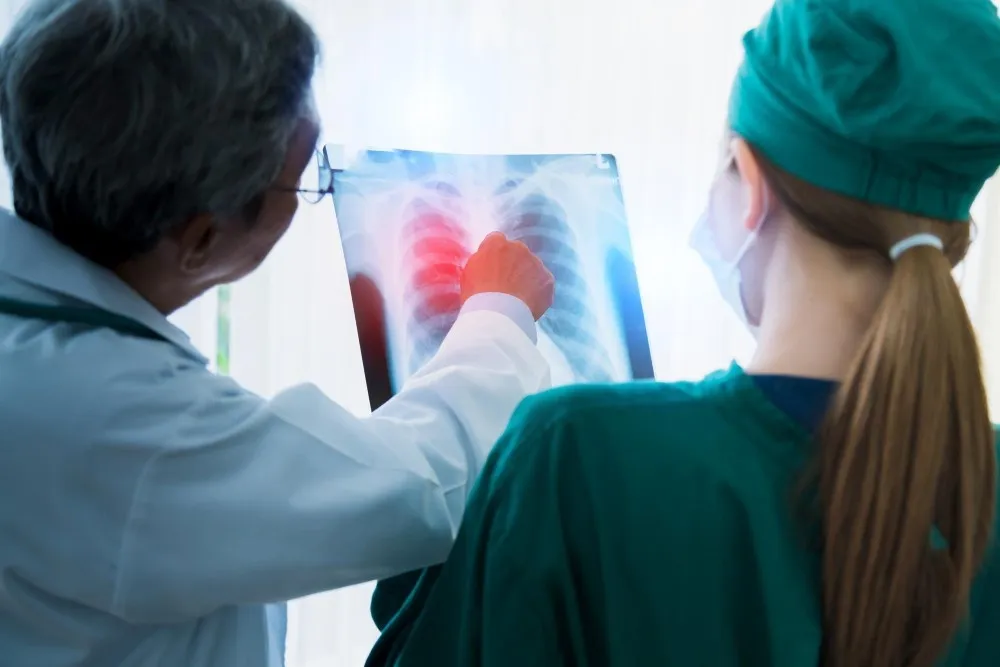Lung cancer, just like the name suggests, develops in the lungs, which are two spongy organs in a person's chest. They take in oxygen you inhale and release carbon dioxide when you breathe it out. The cancer is a result of uncontrolled growth of abnormal cells, which begin in either one or both the lungs. It is generally in the cells, which line the air passages. The abnormal cell growth does not develop into healthy lung tissue like the normal ones do, but they divide quickly and form tumors. As the tumors grow larger in size and number, they start undermining the lung's ability to provide blood with oxygen.
Causes of Lung Cancer
Smoking causes the maximum number of lung cancer cases, not limiting itself to smokers. People exposed to prolonged second-hand smoke can also develop this cancer.
Carcinogens are another cause for cancer. These substances are responsible for damaging DNA, thus promoting or aiding cancer in any way. These include asbestos, tobacco, arsenic, radiation and even compounds from car exhaust fumes. When exposed to carcinogens, free radicals form in our body, which try to steal electrons from other molecules present in our body. These free radicals damage healthy cells and affect their ability to function normally.
Around 85% of lung cancers are as a result of inhaling or smoking carcinogens.
Genes are the other cause for lung cancer. One can be born with certain genetic mutations or faulty genes, which expose them to a higher risk of developing cancer later in their life.
Symptoms of Lung Cancer
Generally speaking, there are no signs and symptoms in its earliest stages. They occur only during the advanced stages of the disease. Typically, symptoms of lung cancer may include the following:- A newly developed cough which doesn't go away
- Chest pain
- Weight loss
- Pain in the bones
- Wheezing
- Hoarseness in voice
- Coughing up blood
- Shortness of breath
- Headaches
Types of lung cancer
Lung cancers have been divided into two major categories based on the appearance of their cells under a microscope. Ar doctor will make his decisions based on which major type of lung cancer the patient suffers from. The two types include:
Small cell lung cancer This type of lung cancer occurs heavily in heavy smokers. It is less common than the non-small cell lung cancer.
Non-small cell lung cancer This type of lung cancer is a term used for different types of lung cancer cells, which behave in a similar way. These types of cancers include the adenocarcinoma, squamous cell carcinoma and large cell carcinoma.
When to consult an Oncologist
If any of the mentioned signs and symptoms begins to develop in you and persist, it is time for you to make an appointment with an experienced oncologist.
If you are a chain smoker who is unable to quit this nasty habit, you should also make an appointment with your doctor because they can recommend strategies, which will help you quit smoking. These strategies can include activities like using nicotine replacement products, counselling, medication, etc.
Read about Superfoods that Fight CancerList of Trusted Oncologists in India
Delhi | Gurgaon | Kolkata | Chennai | Mumbai | Hyderabad | Bangalore
Join Credihealth Cancer Awareness Group to spread awareness about Lung Cancer. [caption align="alignleft" width="170"]
 Credihealth - India's No.1 Medical Assistance company[/caption]
This write-up was contributed by Credihealth content team:
Credihealth is a medical assistance company that gives guidance to a patient from the first consultation through the entire hospitalization process. A team of in-house Credihealth doctors helps the patient find the right doctor, book appointment, request cost estimate for procedures and manage admission & discharge processes.
Share your comments and queries below and we will be happy to guide you through.
Get FREE assistance from medical experts to select the best oncologist & cancer hospital for your treatment.
Credihealth - India's No.1 Medical Assistance company[/caption]
This write-up was contributed by Credihealth content team:
Credihealth is a medical assistance company that gives guidance to a patient from the first consultation through the entire hospitalization process. A team of in-house Credihealth doctors helps the patient find the right doctor, book appointment, request cost estimate for procedures and manage admission & discharge processes.
Share your comments and queries below and we will be happy to guide you through.
Get FREE assistance from medical experts to select the best oncologist & cancer hospital for your treatment.

Reviewed by







